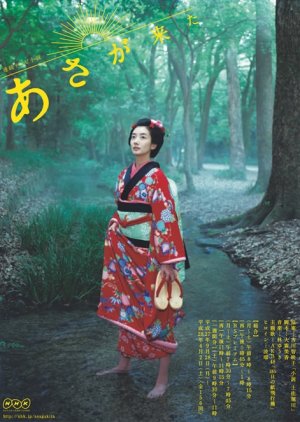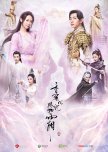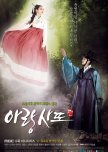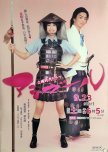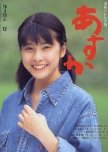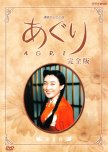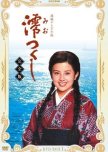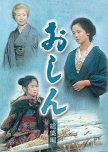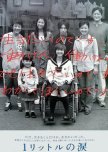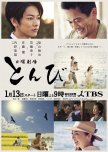
First off, this is a very quality drama. I tend to give a drama a higher rating if I enjoyed it, regardless of how well it was made, but this drama was not only a joy to watch, it was clearly very well made! All of the acting was excellent, the music fit the mood and was well-timed and the filming scenery was beautiful.
The storyline is well thought out and planned. Except for one or two (mostly subjective) points, there were no plot hiccups or illogical characterizations I could pick on. Despite being so long, the story did not drag. Things moved at a very consistent pace and there was no unnecessary dramatics. Watching Asa grow and change in a time when Japan was also growing and changing added to the depth of the story. It was so fun to watch the technologies, clothing, mannerisms and environment changed as the episodes passed by.
All of the characters were well-developed with their own quirks. I just loved watching new side characters slowly being introduced and how they slowly blended into and influenced the overall story. With such a huge cast, there were basically no "useless" characters. Asa in particular was very well-written and well-acted. She grew and changed as she grew older but her sense of self stayed the same. The same could be said of Hatsu too and I loved the strong bond the sisters carried over their lives.
Another thing that made this dorama very refreshing was that Asa was not a "special snowflake" type of lead. Oftentimes, dramas have this tendency to make sure everyone likes (or follows/agrees with) the main lead and if they don't, they are somehow portrayed as one the bad guys or inherently wrong and never part of the "main circle." There were at least a few very prominent characters that gave me the feeling that although they interacted well with her, they never really warmed up to her. Similarly, the fact the drama acknowledges the people that open the way for Asa to become successful. This is actually a minor point of contention. I am very glad the drama recognizes the strong support system it gave Asa because it's important to give credit where it is due BUT I don't believe the real-life Asako had that kind of support, so it sort of discredits her a little?
Finally, I loved how Asa ga Kita shows what it means to be feminist in the most truest way: it's about being able to choose your own path. It's not what you do, but what you are allowed to do. There were a few times I was irritated as certain character actions/thoughts, but then I realized it was for promoting that central theme-that one path is not better than another, it's the fact that you have the option to go on the path you want. Also, being a "strong female character" is not a one-fits-all description. There are a lot of ways to be a strong female and doing things that are inherently masculine (i.e. being able to handle guns, being physically stronger or outspoken) does not make female character "stronger" or "better" than other females and we should not be too quick to throw words like "doormat" or "pathetic" around.
Was this review helpful to you?

The story is based on a real-life person, Asako Hirooka. Even though it is based on her life, there are many differences between the real Asako and Asa. The story in this drama, even though is based on actual events are changed to be more enjoyable (a typical Japanese style, I must say. No melodramatic). It does make the drama more enjoyable but I think it would be also pretty interesting if they based it correctly. I mean. I would really really like to know how it is like during that era. Since I feel like the drama only shows maybe 1/10 of the struggles that the real Asako had faced.
Overall, if you ignore the differences between the real Asako and the drama, this drama is a treasure. It is very inspiring and shows you a real character growth and also point out how important for the society to support and nurture women. That women have the same capability as men or even more.
WARNING: These may make you upset if you are looking for a real real real history story. Don't read it.
The real Asako is a child from a concubine. She and Hatsu have different mothers. The real Hatsu died at the age of 25.
The real Shinjiro, is not really supportive of Asako's passion. Asako called tutors after she got permission from Shinjiro. But he did not really care or believe in her capability in the beginning. In addition, the real Shinjiro, took Asako's handmaid Mume as a concubine (it's normal at that era) after Asako lost her fertility (But Asako had a daughter before this happened). He had 4 children with Mume.
Was this review helpful to you?

This review may contain spoilers
I will try not to write spoilers as much as I can (except for characters).First of all, this is the BEST Japanese Historical Drama for me and the longest drama I've ever watched in terms of the number of episodes. I have watched other asadoras before but this was my very first asadora that I began watching in 2016. I was feeling very depressed because my studies weren't progressing as well as I expected it to and needed a drama to motivate me and that's how I came across this severely underrated drama. When I saw that there were very few ratings for it, I was discouraged from watching it but I really wanted to see dramas on women taking their lives into their own hands and making a difference in the world. Whenever I listen to my English teachers talk about how there are very few women in politics in this world and women still being discriminated in some parts of the world, a part of me felt put down. Being a woman myself, I could relate to some of the issues that Asa faced in this drama. So this drama really connected to me on a personal level.
Overall story:
This story is about a girl who questioned everything that happened in her life instead of only doing what she was told without knowing about anything. This drama shows a lot about gender inequality in the past and shows that even women can overpass their husbands and are capable to take care of the family even when their husbands are unable to do so.
Women weren't only born to take care of the house, get married and give birth to an heir. Women were also born with a purpose in life.
This is an inspirational drama that helps motivate the viewers when you are going through tough times.
I highly recommend all girls to watch this drama. Not only girls, but everyone is encouraged to watch this drama. It isn't your normal historical dramas, or any drama we have seen before. This is about a woman who founded the first female university in Japan.
I loved how the drama progressed. This being my very first asadora, I was surprised to see how short the episodes were and thought it would just get boring 10-20 eps later since the eps were too short for the story to progress much. But I was totally wrong.
The drama mainly focused on Asa's journey from a young child to becoming a woman, getting married, having her own child, getting into business, becoming a great entrepreneur and making a name for herself. The story was told in such an interesting way that I found myself clicking the next episode and continued watching it through the night and even in school.
I found myself grinning, giggling, squealing, crying, getting angry and frustrated at some characters, I loved the whole journey. I felt like I was part of Asa'a life. I was probably introduced to over a 100 characters in the drama but surprisingly, despite usually forgetting most of the stories of dramas I watch, I remembered every single character to ever appear on this drama. That's how much the story and every single character had touched me.
Characters:
This is going to be very difficult to write about without spoiling anything. So don't read this part if you don't want any spoilers.
I really loved the growth of the characters in this drama.
Asa's father:
Initially, Asa's father was really against Asa studying and always scolded her. I knew that he really cared for Asa and wanted the best for her so I didn't dislike him but I was not particularly fond of him either since he prevented Asa from getting the education she had wanted to have just because she was a woman. I really loved how Asa talked back to her father asking him why girls can't study and why girls have to get engaged at such a young age with no say in their life. Despite the harsh scoldings from her father, Asa never gave up on what she believed in and continued to pursue her dreams.
Later on in the drama, Asa's father realised how mistaken he was about Asa and told her husband how much he regretted not giving Asa the education she had wanted. I could really tell how much he cared for Asa and was really happy when he finally realised how great of a woman Asa had grown up to be.
Asa's mother:
She always helped Asa out whenever she was in trouble with her father. She always advised Asa on how to become a good wife for her family. i really loved the mother here. I could truly tell that she cared deeply for her family. When Hatsu, Asa's older sister went to meet her future husband for the first time, the mother felt that her future husband seemed to be like a mother's boy and was worried for her daughter. She even spoke to her husband about it and tried to come up with a solution.
Asa's grandfather:
He always believed that Asa will become a great woman in the future and always encouraged her to give her best shot in the things she wanted to do. I really loved the grandfather a lot and also liked how much he trusted Asa.
Godei: (The so-called second lead)
I really really loved him a lot in this drama. Honestly, I did ship Asa and Mr Godei together more than once in this drama. If Asa had married Godei, I'm sure they would have made a really good match and would have been able to establish much more than what they have right now. I felt Asa was a bit restricted to financial and banking side because of her husband and if she were to have married Godei, things would have turned out a lot more differently. But at the same time, I still think that Asa wouldn't have become what she is today, without the help of her husband, which I'll talk about later.
Godei loved the strange girl, Asa, ever since he met her at Osaka when Asa was only about 10 years old. He later became a famous person who was part of the new government and helped Asa grow as a businesswoman. He supported her, helped her in her journey, and advised her on a lot of stuff regarding business.
You could really tell he was in love with her and how much pain he was in because of that. But after a while, he started respecting the fact that she is a married woman and later even became friends with her husband.
Ironically, Asa's daughter, Chiyo's first love was Godei also even though she herself was unaware of it, only Ume(Asa's dowry maid) knew about it. (This kinda reminded me of Twilight). But don't worry, she was only 6 at that time so obviously nothing happened.
Asa's father-in-law:
I am really thankful to him for being such a nice and understanding father-in-law who let Asa study business and help with work-related issues when all the people surrounding Asa were against letting a woman help with the business. If it weren't for him, no one would have discovered Asa'a talent in business and Asa would have never been able to accomplish her purpose in life.
Asa's mother-in-law:
She was a really fun character. She disliked Asa at first since she didn't behave like the proper lady everyone expected to and was always interested in business and always asked the question 'why'.
But as the drama progressed on, you could tell that she grew to like her a lot. She wasn't the hateful mother-in-law at all, not even for a single moment. She did suggest getting a mistress for Asa's husband at one point in time but never really went on to accomplish that idea without permission from Asa. I wasn't happy that she even thought about such a thing in the first place but I was a bit happy that at least she wanted to lessen the burden of taking care of house and having children by taking in a mistress and even asked Asa for permission first before getting ahead of herself.
Well, she can be annoying at times, but I can't help but love her. She was one of the best mother-in-law one could ever ask for. I liked how much she took care of Asa's daughter since Asa was busy with work most of the time and she really adored Chiyo a lot.
Asa's sister, Hatsu:
She was the closest to Asa since birth. Hatsu was the total opposite of Asa. She was the ideal wife, most men would like to have at that time. She never once spoke against her father even when she felt scared upon meeting her future husband for the first time and always listened to what her parents say, unlike Asa. Hatsu always felt envious of Asa as she herself could never go against her parents' wishes nor be as outspoken as Asa was. Asa was also envious of Hatsu as unlike Hatsu, Asa could never behave lady-like nor be as graceful.
Hatsu went on to marry Soubee and was initially mostly ignored by her husband and bullied by her mother-in-law who was really strict. She felt very scared and lonely and wasn't allowed to meet with her sister. But as time passed by, her husband became nicer and you could tell he was beginning to fall for her. Once there was a change in the government, most of the money changers went bankrupt and out of business, Hatsu's family was one of those who had to run away in the middle of the night because of all of their debt that had accumulated. They became poor overnight and fought hard to protect their family. Hatsu's mother-in-law blamed her son and Hatsu for not being able to maintain their business and Hatsu went though a lot of difficulties during this time. She became pregnant and had to give birth to her son without her husband who ran away a few months ago.
I really admired Hatsu's strength. She was not a woman to be taken lightly either. She was from a rich family and knew very little about the world. When she was scared and lonely, she faced the challenges head on and always helped to protect her family through the difficult times. not once, did she give up on her husband, mother-in-law nor on protecting her family. She's the kind of woman I aspire to be.
Asa did face her own challenges as well, but she had her husband and his family supporting her the whole time while Hatsu had to face the challenges alone and didn't want to lean on her sister nor her family. I really loved her character growth in this drama.
Hatsu supported Asa's dreams since she was young and knew that Asa would one day become a much greater woman that she could ever dream of, and she was right in the end. I was sad that Hatsu couldn't see Asa's growth personally but was glad that she was on Asa's side from the start till the end of her journey.
Asa's husband, Shinjiro:
When Asa was young, she refused to get married without being able to choose what she wanted to do in her life. Asa's husband, Shinjiro, supported her dreams and told her that it was up to her to decide whether she wanted to marry him or not in the future. He always gave her a choice and let her decide what she wanted to do. Asa soon became to fall for him and always looked forward to meeting him every year before her marriage.
Shinjiro was a playful boy who never thought about taking care of his family's business since he was the second son of his family. He is 11 years older than Asa.
I initially thought of him to be a useless husband since all he did was play shamisen and drink most of the time but boy was I wrong. He had the most connections with a lot of people because of his shamisen plays, and always hears a lot of talk about business though he is mostly uninterested in it. He also encouraged Asa to do whatever she wants with her life and never forced her to do anything. He sometimes advised Asa on business related stuff and even secretly helped her with the business without telling her.
Shinjiro was the one who understood Asa the best. he knew what was going in her head, all the worries she had, and always tried his best to make her happy. I thought that he was the perfect husband a girl could have as:
1. He supported his wife's dreams and respected her a lot
2. He always protected his wife, and would do anything for her
3. If anyone spoke badly about her wife, he will not stand it
4. He always thinks about his wife first and he loves her the most
5. He's the most understanding husband one can ever have. Despite her talking about business all the time, and always spending her time outside, he trusted her fully and supported her with all his heart.
Shinjiro was really suited to be Asa's husband. If he wasn't as playful as he is in the drama, then Asa would have never gotten the chance to become who she is today. If she didn't have her husband by her side, Asa wouldn't have been able to accomplish much like she had either, as she had mentioned in the drama itself multiple times.
In the end, she said that it's thanks to her husband and father-in-law that she is who she is today. If they hadn't supported her throughout the journey, she would have never been able to make it this far.
I really miss Shinjiro a lot >.<
[Incomplete review- I do not have much time so I will continue writing this on another day].
Was this review helpful to you?

This review may contain spoilers
"First Penguin"
"Asa ga Kita" is the fifteenth asadora I've watched. While watching the last six weeks of episodes, I realized that the story sounded familiar. Naturally, I looked up the woman whom Shirooka Asa (played by Haru) is based on. Her real name was Hirooka Asako by the way. Finally, it clicked and a pulled out the book, "Anne's Cradle: The Life & Works of Hanako Muraoka." This book serves as the basis for the 2014 asadora, "Hanako to Anne," which was also my first asadora. The author dedicates a few pages to Hirooka Asako, whom Hanako met when Asako was in her sixties and she apparently influenced some Hanako's feminist leanings. I'll include this quote by Asako, which influenced Hanako and others Japanese women of the time:"From here on, politics will be crucial. Unless we raise up female politicians active in governing this country, true emancipation for women can never be achieved. We must start by obtaining the right to choose our leaders, the right to vote, just as women in other countries have done. You must work together for the same goal."
Another Japanese feminist, Hiratsuka Raicho, who appears in the final week of "Asa ga Kita," is also mentioned in this biography. I'm including this in my review not just because it's interesting but to highlight that "Asa ga Kita" is one of the more overt feminist asadoras. It doesn't exactly "go there." For example, there's no mention of women's right to vote. And, as much as I wish it had gone there, my hat goes to it for even touching what it does. You could argue that all asadoras are feminist, but in a more sanitized way in my opinion. "Asa ga Kita" highlights the strength, problems, and progress of women during the Meiji era, a much more oppressive time period than when most asadora are set.
Speaking of time period, "Asa ga Kita" begins in 1857 and is set mostly during the Meiji era. This is a very interesting time period for Japan and really laid out the groundwork for what modern day Japan is. Also interestingly, this is the earliest time period for an asadora. (NHK appears to reserve this time period for their taiga dramas instead.) The asadora starts off with traditional kimono and topknots, and by the end there are dresses and cropped hairstyles everywhere. It's an interesting dichotomy and serves as a good example for the changes of the era. Moving on from history...
The best part of "Asa ga Kita" are the characters, of course. Haru plays the pioneering businesswoman Shirooka Asa, a tomboy who questions why women can't learn. Miyazaki Aoi plays her sister Hatsu, a traditionally feminine girl with a hidden strength. Hatsu is often the secondary main character, but the narrative smartly recognizes when her story isn't as interesting as Asa's and we won't see her for a while. Nevertheless, we follow her throughout her life and her romance with her husband Sobei (Emoto Tasuku) is very compelling. Next, we have Asa's husband Shinjiro, a man who prefers to indulge in his various hobbies instead of participate in the family business. Even though, he sounds like a "useless" man, he is played perfectly by Tamaki Hiroshi, giving him both humor and humanity. As a husband, he is always supportive of Asa which only makes him more endearing.
Asa's and Shinjiro's only daughter, Chiyo (Koshiba Fuka), comes off as very annoying at first, being the opposite of Asa but also not seeing the value of someone like Asa. I thought she was going to fall into the trap of other asadora children at this point. Thankfully, the writers have here come to appreciate Asa though Chiyo remains the complete opposite of her nonetheless. The final character I'd like to talk about is Godai Tomoatsu (based on a real figure and played by Dean Fujioka. He is what every second male lead should be. Someone who doesn't impose his feelings on the FL and just supports her from afar. Honestly, he had my heart beating fast at certain points. There are a plethora of other side characters who are all endearing in their own way.
"Asa ga Kita" surprisingly has four romantic couples to get invested in. Asa and Shinjiro are the best of course and are now my favorite asadora couple ever. Hatsu and Sobei are super sweet together despite their rough start. Kisuke and Fuyu seem kind of mismatched but I couldn't help rooting for them. I was a bit sad that Fuyu doesn't appear again after their marriage, but I suppose that Kiyohara Kaya (see Natsuzora, Okaeri Mone) just appeared too young at the time. Lastly, there's Gansuke and Ume, a couple that doesn't need to be together to know that they love each other. Honestly, I felt very spoiled with the amount of couples in this one.
Okay, this review is getting to long so let's wrap it up. "Asa ga Kita" includes everything you could want in an asadora and then some. I recommend this to old and new asadora watchers alike. (I hope I didn't spoil it too much.) If you're looking for a next watch after this one, I recommend the 2024 asadora "Tora ni Tsubasa" which explores similar feminist ideas as "Asa ga Kita" but in a more "in your face" way. Happy watching!
Was this review helpful to you?

